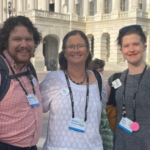A small eco-friendly brand in Cameroon is making waves in the sustainable clothing movement across the continent. Catharina Natang, the CEO of Catharina Natang, a Cameroonian fashion brand, has been leading the charge in fighting plastic pollution through her fashion designs. Inspired by Catherine Natang, Nkwati Elsa-Rita, a resident of Buea, Cameroon, has become an advocate for sustainable fashion and is committed to reducing her environmental impact through her clothing choices.
Cameroon, like many countries, faces a significant challenge with fashion waste. With rapidly-changing fashion trends, people often discard clothing items that end up in garbage piles or clogging waterways. Plastic pollution is a major environmental issue in Cameroon, with over 600,000 tonnes produced annually. Fashion products contribute significantly to this waste, with Cameroon being the 18th-largest importer of used clothing.
Catherine Natang aims to tackle these challenges by focusing on three main pillars: using environmentally friendly fabrics, reducing fashion waste through repurposing and redesigning, and increasing the lifespan of clothing items. She wants to ensure that people can dress well without harming the environment.
Natang has been able to mobilize 85 fashion designers in Cameroon and across Africa to join her sustainable fashion network. These designers produce an average of 600 kilograms of waste per year, with over 66% of the waste being repurposed into new fashion wears. In January 2023, Natang organized Cameroon’s first-ever sustainable fashion show to promote the trend and encourage other designers to embrace sustainability.
However, Natang’s journey has not been without challenges. Convincing other designers to change their approach to fashion design and convincing customers to choose eco-friendly fabrics are ongoing struggles. Additionally, the high operational and storage costs of environmentally friendly fabrics make it difficult for many customers to afford them.
To further support sustainability in the fashion industry, Natang and her colleagues are exploring opportunities to establish a fabric recycling and production plant. They aim to create eco-friendly fabrics using raw materials such as banana stems and pineapple waste. Natang’s team has also developed




